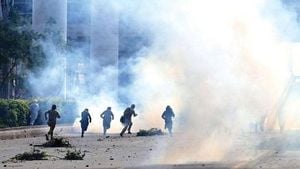A teacher from Bihar's Jehanabad district has been dealt severe backlash following the emergence of her controversial video, which is rapidly making rounds across social media platforms. The teacher, identified as Dipali Shah of Kendriya Vidyalaya, found herself suspended after she aired her grievances about being posted to what she described as "India's worst region."
Shah, who is on probation, was recorded venting her frustrations about her assignment during what appeared to be informal discussions captured on video. "Kendriya Vidyalaya is present in so many regions in Bihar. People don't like the Kolkata region, but I was ready even for [an assignment there]. I had no problems with anywhere in Bengal. But what enmity did they have with me to give me posting here, to India's worst f*****g region?" she stated with palpable irritation, referring to her current station.
Her comments took on an even more contentious tone when she continued, implying the lack of civic sense among the people of Bihar. She stated, "I think India is only developing because of Bihar. The day we remove Bihar from India, it will be developed. People have no civic sense; they have messed up the Indian Railways." These sentiments not only reflect her discontent but also resonate with the persistent stigma surrounding Bihar as a state viewed unfavorably by many.
The incident sparked outrage online, resulting in widespread condemnation from the public and political circles. Notably, Shambhavi Choudhary, the local Member of Parliament, swiftly responded by penning a letter to the Kendriya Vidyalaya Sangathan (KVS), demanding immediate disciplinary action against Shah. Choudhary's letter described the remarks as "inappropriate, unacceptable, and unbecoming of an educator". The MP articulated her concerns over how Shah's statements adversely affected the sentiments of Bihar's populace, emphasizing the importance of accountability for teachers tasked with shaping young minds.
After the video went viral, KVS responded by suspending Shah and issued a statement through their regional office based in Patna. The statement read, "According to rule 10 of the Central Civil Services (Classification, Control and Appeal) Rules, 1965, Dipali, the primary teacher posted at KVS, Jehanabad, is suspended with immediate effect. She will report to KVS, Mashrakh, located within Saran district." This decisive move showcases KVS's accountability standards and their zero-tolerance policy toward teachers who undermine their role as educators.
The principal of KVS Jehanabad, Ravindra Ram, termed the incident as Shah's "personal matter," but acknowledged the necessity of reporting it to higher authorities. Conversely, Alankrita Pandey, the District Magistrate of Jehanabad, directed for a thorough investigation to verify the video's authenticity and assess any potential violations of ethical conduct. The administration's actions demonstrate recognition of the incident's gravity, as it juxtaposes the values expected from government educators against public professionalism.
The rapid spread of Shah's disparaging comments across social media platforms has ignited widespread conversations about regional pride and the obligations of public servants, especially educators. Many netizens took to various platforms to express their sentiments, with some condemning Shah’s remarks as damaging to the integrity of Bihar and its inhabitants, reinforcing the belief of unacceptable public conduct from individuals placed within educational roles.
Such incidents raise imperative questions about educator accountability, sensitivity, and the broader impact of their statements on local communities. The situation becomes even complex considering how educational professionals are often seen as role models who should embody and promote the respect and dignity of the regions they serve.
This case continues to stir discourse on social media, fueling concerns about the respect afforded to local cultures and sentiments within Bihar. The public anticipates formal consequences for such actions, elucidated through Shah's case, where expressing baseless grievances transformed from mere dissatisfaction to socially charged remarks laden with insulting overtones.
One sentiment echoed by users reflects the collective hurt caused by the perception of Bihar often being viewed dismissively, spotlighting enduring stereotypes of the region's residents. This incident propels the discourse around the value of mutual respect and reinforces the notion educators must approach their responsibilities with mindfulness and care, especially when voicing personal beliefs publicly.
While individuals express their right to personal opinion, the repercussions of such statements highlight the need for professional boundaries and accountability among educators. Dipali Shah has attracted significant scrutiny not only for her lack of respect for the location of her assignment but also for exposing her unprofessional attitudes toward the diverse populace she is expected to educate.
Overall, the fallout from this incident remains volatile as public scrutiny grows over educators' roles within society—questioning how personal sentiments should be navigated within professional settings and how institutions like KVS can brace for backlash stemming from employees' free speech expressions. Many wonder if this will serve as both a teaching moment and catalyst for change within the Kendriya Vidyalaya system, aiming for progress toward fostering respect and dignity within educational frameworks.
The expansive dialogue initiated by Shah's video raises more than just the eyebrows of authorities; it brings forth societal mirrors asking, what kind of education values should be upheld? Perhaps now, more than ever, Bihar's voice needs to be heard, paving the way for growth, improvement, and change amid challenges posed by misrepresentations and grievances."



